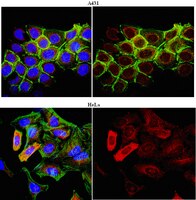05-1078 Sigma-AldrichAnti-STAT3 Antibody, clone 18F7.1
Use Anti-STAT3 Antibody, clone 18F7.1 (mouse monoclonal antibody) validated in WB, ICC to detect STAT3 also known as Acute-phase response factor, DNA-binding protein APRF, signal transducer & activator of transcription 3.
More>> Use Anti-STAT3 Antibody, clone 18F7.1 (mouse monoclonal antibody) validated in WB, ICC to detect STAT3 also known as Acute-phase response factor, DNA-binding protein APRF, signal transducer & activator of transcription 3. Less<<Recommended Products
Áttekintés
| Replacement Information |
|---|
Kulcsspecifikációk táblázata
| Species Reactivity | Key Applications | Host | Format | Antibody Type |
|---|---|---|---|---|
| H, M | WB, ICC | M | Purified | Monoclonal Antibody |
| References |
|---|
| Product Information | |
|---|---|
| Format | Purified |
| Control |
|
| Presentation | Purified mouse monoclonal IgG1κ in buffer containing 0.1 M Tris-Glycine (pH 7.4, 150 mM NaCl) with 0.05% sodium azide. |
| Quality Level | MQ100 |
| Physicochemical Information |
|---|
| Dimensions |
|---|
| Materials Information |
|---|
| Toxicological Information |
|---|
| Safety Information according to GHS |
|---|
| Safety Information |
|---|
| Storage and Shipping Information | |
|---|---|
| Storage Conditions | Stable for 1 year at 2-8°C from date of receipt. |
| Packaging Information | |
|---|---|
| Material Size | 100 µg |
| Transport Information |
|---|
| Supplemental Information |
|---|
| Specifications |
|---|
| Global Trade Item Number | |
|---|---|
| Katalógusszám | GTIN |
| 05-1078 | 04053252680809 |
Documentation
Anti-STAT3 Antibody, clone 18F7.1 MSDS
| Title |
|---|
Anti-STAT3 Antibody, clone 18F7.1 Certificates of Analysis
| Title | Lot Number |
|---|---|
| Anti-STAT3, clone 18F7.1 - 2278547 | 2278547 |
| Anti-STAT3, clone 18F7.1 - 2360021 | 2360021 |
| Anti-STAT3, clone 18F7.1 - 3307759 | 3307759 |
| Anti-STAT3, clone 18F7.1 - 3501004 | 3501004 |
| Anti-STAT3, clone 18F7.1 - NG1944098 | NG1944098 |
| Anti-STAT3, clone 18F7.1 - NRG1781529 | NRG1781529 |
| Anti-STAT3, clone 18F7.1 -2664243 | 2664243 |
| Anti-STAT3, clone 18F7.1 -2697399 | 2697399 |
| Anti-STAT3, clone 18F7.1 -2752573 | 2752573 |
| Anti-STAT3, clone 18F7.1 -2801955 | 2801955 |
Technical Info
| Title |
|---|
| JAK/STAT Signaling Research Focus |








